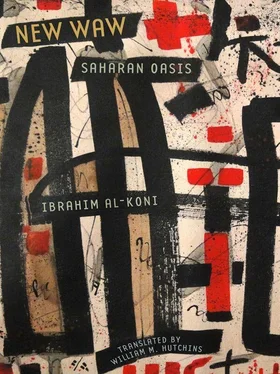3
In the morning the children found the venerable bird squatting on the ridgeline of a tent. The kids discovered him after the grown-ups had departed to attend to adult affairs. Then the boys surrounded the dwelling and debated how best to reach him. One fetched a long pole and beat on the corner of the tent to frighten their guest, but the haughty bird remained huddled there, holding his long neck back, shielding his head with his wings, and then extending his red beak into the air. He opened his eyelids entreatingly, revealing an anxious eye. A tall, scrawny lad picked up a stone, which he lobbed toward the bird. It rolled over the haircloth fabric and down the tent’s other side. Then some boys started yelling, waving their fists in the scrawny youth’s face.
“This is a sin. It’s like hitting your mother or father. Would you throw a rock at your mother? If the adults see you, you’ll be punished.”
A boy, whose head sported a Mohawk that resembled a hoopoe’s crest, jumped from the pack and warned, “Keep away! He’s my guest. Don’t you see that he chose our home, not any other? I knew he would come ’cause I’ve seen him in a dream three times. He brought me good news! The grown-ups say birds bring good news.”
The tall, lanky boy with the pole mocked him. “Good news? Don’t you see he’s old? Old birds bring bad luck, not good news.”
“How do you know he’s old, sourpuss?”
“Just look at him. Can’t you see he’s old?”
“Perhaps he’s tired. Don’t forget he’s come from a distant land.”
“If he weren’t old, he wouldn’t have stayed behind when his flock left.”
“Perhaps he’s ill or wounded. I don’t see anything that shows he’s old. Guys, do you?”
The children yelled, but the thin boy’s voice rang out once more. “The bird’s old, and old birds bring bad luck. Drive the ill-omened, old bird away if you don’t want misfortune to strike your house.”
The boy with the Mohawk lost his temper and shouted, “You talk this way ’cause you’re jealous. You’re a bad, hateful boy and talk that way ’cause you’re jealous.”
But the thin boy started to circle the tent, hopping on one foot, and chanted the cruel song that has been passed down from one generation to the next. The boys’ ancestors supposedly sang it over the heads of the elderly, who were thrown into pits, where they were left to their fate.
Wiggegh temmedrit atgeed ad tedwelad .
Wiggegh torna atgged at tezied . 4
You’re not a child we’re waiting to see grow up.
You’re not a sick man we’re waiting to see recover.
A group of boys answered this call and chanted the cruel refrain, dancing along behind the thin lad. The other group stood frozen, glancing back and forth between their naughty playmates and the bird that crouched on the tent. Many of them expected to see him recoil and shrink back as the racket made by the boys reached a crescendo and their voices grew even louder to match the agonizing rhythm.
4
Around noon the bird twitched, edged up a little higher, and spread out his right wing and right leg as if stretching. Then he unfolded his left wing and held it extended over his left leg for a time. He pulled himself erect and straightened his very tall frame — his scrawny body supported by two even scrawnier legs. His long beak, which was thrust forward, was longer than his legs.
In the crowd of boys, a voice exclaimed, “This isn’t an abil-bil .”
The boy whose tent the bird had chosen retorted: “Are you adult enough to know all the kinds of birds?”
Another voice called out, “He’s right. This is some other bird, an unknown species.”
The tall, lanky boy intervened, “Whether he’s an abil-bil or some other bird, he’s certainly old, and old birds bring bad luck to camps.”
The bird flapped his wings and beat the air listlessly and desperately. He held his wings extended for a moment and then emitted a strange cry, a muffled squawk, before fluttering his wings and attempting to fly. He rose barely a foot into the air with a ponderousness, slowness, and awkwardness that did not match his meager body. He fluttered his wings with all the ponderousness, slowness, and awkwardness of chickens that rebel heroically against their nature, experiment with disavowing their origins, and take flight, becoming callow citizens of the heavens.
The bird headed toward Retem Valley, covering some distance. Then he fell, descending to the earth like a chicken. He fell ignominiously, in a manner ill-befitting a bird. He plummeted but never stopped beating the air with his large wings, which were lustrous but marked by feebleness and blackness. He touched the ground with his feet, and his toes scratched grooves into the earth for a long distance. The children pursued him, and he ran clumsily from them like a crow. He ran as if favoring his right leg and the left one as well. When the boys closed in on him, he rose again some inches into the air before falling back to earth. He landed in an embarrassing way, and his noble beak sank into the dirt. He wrested it from the furrow, from disgrace, and beat the air with it to shake off the dust and humiliation. In his tired, languid eyes the boys saw the gleam and moisture of tears.
Then the lanky lad said meanly, “Didn’t I tell you he’s old?”
5
The sun was starting to set, and shadows were stretching toward the East. The North was liberal with moist breezes, and the heat’s scattered remnants were retreating with the passing of the siesta hour. So people were emerging from their tents, and the nobles sought refuge in the shade of their homes to debate, wrangle, and enjoy the evening shade and the Northern breezes.
The leader also resorted to the shade of the tent.
He sat on an old leather mat that time’s tongue had licked, stripping it of all its hair. He began to amuse himself. In his lap he placed a piece of barley bread, which he started to crumble in his hands, throwing morsels to the bird, which proceeded to bend over these crumbs, languidly and nonchalantly plucking up bits, as if eating not because he was hungry but because he too wanted to amuse himself. The leader murmured, “You’re really old. You’re so old that your advanced age was obvious even to the youngsters.” The leader had rescued the elderly bird from the hands of those wretches some days earlier. He had gone to Retem Valley at noon and found the bird running in a ridiculous fashion, desperately fluttering in an attempt to liberate itself from the earth, from the burden of the earth, from the sovereignty of the earth — but to no avail! Creatures when they become senile, when they grow old and become weak and incapacitated, find the earth waiting for them, find that the earth is their destiny, that the earth is their eternal homeland, their last resort, even if these creatures are celestial beings, even if these creatures are one of the sky’s communities like the birds! If the earth weren’t so greedy, if the earth weren’t so ignoble, if the earth weren’t so wise, it wouldn’t have been able to find on its surface any dust from which to create creatures. What is the dust of the earth if not the bones of past creatures and the graves of the dead who in antiquity became food for the earth? How can this wise mother create a being that strives if she does not sustain herself? In ancient times, didn’t the people of the desert produce the body of the desert? This is the sign. The senile bird was a sign. An aged being weighs heavily on the earth, because she attracts him, pulling him to her. She tells him, “Your return is approaching. The time when you are destined to return to my belly is nigh. I have lavished food on you while you were alive. Today you must draw near and prepare to provide nourishment for those who come after you.” The creature is afflicted with terror. The bird was afflicted with terror, because he sensed an unaccustomed weakness and a mysterious force that was drawing him to the lowest possible level. His wings betrayed him, his body failed him, and the sky drew farther away from him, because he did not know that the sky itself, his homeland the sky, was also incapable of changing a single symbol in destiny’s Law. It had handed him over to destiny, which was ramming him downward, executing the harsh dictate to return him to the earth.
Читать дальше












